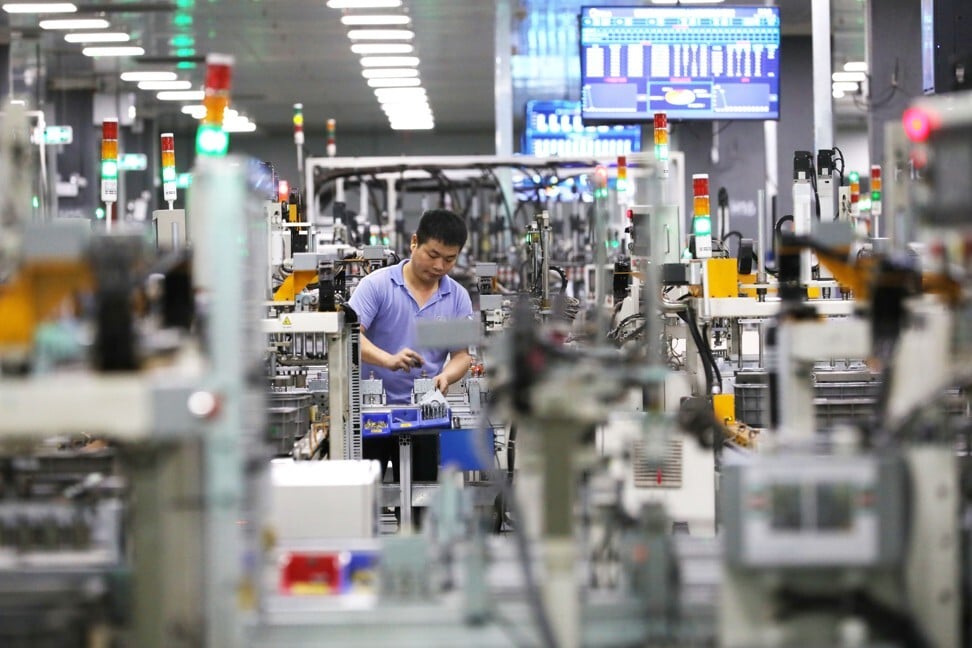
Midea’s new CFO wants to transform the appliance king into a tech giant that competes with General Electric and Xiaomi
- Midea CFO Jeremy Choy, a former Hong Kong banker, says Midea is a technology company that competes in smart homes, robotics and industrial automation
- After losing its former Austrian CFO, Midea is looking for people like Choy to further expand its international footprint, the new executive says
Seven months into his new role as the chief financial officer of Midea Group, 39-year-old Jeremy Choy is starting to feel at home in Foshan, a city neighbouring Guangzhou in southern Guangdong province.
“Many people still regard Midea as merely a home appliance company, but if you look at our broad product portfolio in smart homes, building technology, robots and industrial technology, we are in fact a technology company,” he said.
Before moving to mainland China from his native home of Hong Kong, Choy was head of Asia technology mergers and acquisitions for HSBC. Before that, he worked for Goldman Sachs and JP Morgan. He joined Midea in April, shortly after the appliance brand saw its market capitalisation soar past 700 billion yuan (US$109 billion).
Choy succeeded Helmut Zodl, Midea’s Austrian CFO, who resigned in January.
Midea has been trying to make its senior management more international in recent years.
“Midea approached people like me because they want international experience,” Choy said. “With close to half of our revenue from overseas markets and partnerships with players around the world, I genuinely believe Midea is one of the most global companies in China.”
Choy is now one the many Hong Kong professionals to seek new opportunities across the border in mainland China. Demand for expert services from Hong Kong is on the rise as enterprises like Midea seek to increase their global footprint and give themselves technological makeovers.

Several new bets in recent years have helped the mature appliance maker maintain growth. Profits grew 4.4 per cent year on year to 8.4 billion yuan in the third quarter, according to the company’s latest financial filing.
Midea’s IoT efforts remain relatively nascent. The company has only about 52 million connected devices, compared with Xiaomi‘s 350 million as of May, a number that includes the smartphone brand’s many handsets.
However, Midea has a supply chain advantage in this area, according to Choy. “A key advantage lies in our deep involvement in the whole product cycle – we research, design and manufacture all our products,” he said.
Medical equipment is another focus for the company. Choy said Midea is following in the footsteps of General Electric, Siemens and Philips by moving into the industry known for its high profit margins.
The Kuka acquisition helps with this. The German firm makes a robotic arm that can be used for precise surgeries such as knee replacements. It also owns Swisslog, a Swiss company known for logistics automation, which uses a pneumatic tube system and autonomous service robots to help hospitals transport medicine.
In February, Midea bought a controlling stake in Shanghai-listed Beijing Wandong Medical Technology, a leading maker of X-ray machines, for 2.3 billion yuan.
Still, Midea has faced hurdles in its pursuit of technological supremacy. Kuka sales were rapidly declining when Midea acquired it, and its market capitalisation had been shrinking. After an unprofitable 2020, Midea reported Kuka turned a profit last quarter.

01:11
Foshan, 'Guangzhou's little brother', offers rich traditional Chinese culture
An ascendant Midea with global ambitions is exactly the type of company Choy was looking to work for when he decided to leave the world of high finance in Hong Kong. Among the companies to make him an offer, Midea was the most international, he said.
“Given the increasing amount of friction and misunderstanding between China and other foreign countries, it is rare to find a company like Midea that can still operate in such a global manner,” Choy said. “Many Chinese companies have significantly scaled down their overseas investments, but not us.”
The career banker now wants to introduce his new colleagues to more international practices, with one of his goals being to get others to join him for happy hour drinks. “They still don’t have the habit of grabbing a few drinks as the day winds down,” Choy said.
“But you know what? We are having hairy crabs for afternoon snacks these days, so no complaints.” he added, smiling.

